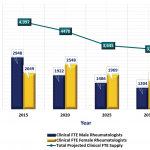This spring, the ACR Research and Education Foundation (REF) presented an interim solution to increase funding for fellows-in-training. The REF, in conjunction with the ACR Committee on Rheumatology Training and Workforce Issues, developed a pilot program built on an already successful award program, the Rheumatology Fellowship Training Award. The current award of $25,000 is insufficient to fully fund one year of a fellow’s salary, so the pilot program earmarks two grants at $50,000 each to allow programs to fully fund one fellow for a year. Program directors can leverage this funding to gain additional funding for second- and third-year fellows, or to fund another slot. The pilot program is designed to address three goals: create a new fellowship position, preferably one that was previously ACGME-accredited but unfilled due to lack of sufficient fellow salary funding; increase the number of underrepresented minority fellows-in-training; and fund a fellowship slot committed to fellows-in-training with a high likelihood of pursuing a career in academic rheumatology. The pilot program will continue for at least two cycles while the REF evaluates the efficacy of this funding increase.
Promoting Diversity
An increasingly diverse population, coupled with growing evidence of persistent healthcare disparities faced by minority populations, demonstrates a need for a more diverse rheumatology workforce. The 2006 Rheumatology Workforce Study by the Lewin Group found that only 5% of rheumatologists designated themselves as African-American or Hispanic. By 2050, racial and ethnic minorities are projected to account for half of the U.S. population. Because minority physicians are more likely to treat minority and indigent patients and to practice in underserved communities, it is imperative that we increase the number of minority physicians—and soon.
Increasing diversity in the physician workforce ensures that the healthcare system is representative of the nation’s population and responsive to its healthcare needs. We must continue cultivating a more culturally diverse workforce in order to provide the best care to an increasingly diverse population.
Next Steps
A 10% annual increase in rheumatology fellow trainees is the minimum needed to meet projected needs for clinical rheumatologists. There are many challenges to meeting this workforce demand, and the ACR continues to examine workforce trends and look for ways to improve processes affecting the physician pipeline. While it is certainly true that subspecialty choice depends on the individual decisions of medical students and residents, we, as an organization, must do everything we can to promote rheumatology and encourage students and residents to consider a career in this meaningful area of work. Many factors, including an aging population, rising obesity rates, and prolonged survival of patients with chronic disease are placing our physician workforce under stress. While the ACR makes strides to evaluate the ever-changing landscape, we must remain aware and engaged in the current reality. Increasing the size and diversity of our workforce requires that we be innovative, from how we run our practices now to thinking about who will run and work in our practices in the future.


